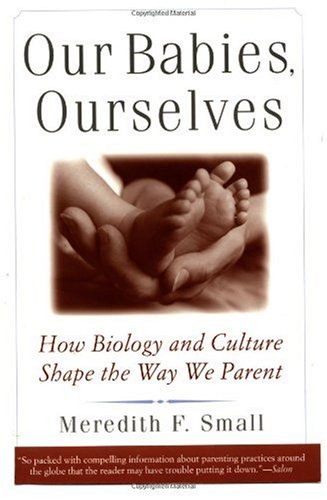The Importance of the Mother-Infant Bond
In the 1960s a slow revolution in birthing practices began in Western culture. As a result of the influence of John Bowlby's attachment theory and Harry Harlow's infant monkey experiments, the medical establishment realized the importance of physical proximity on the bonding process and babies were not necessarily removed to the nursery. The feminist movement in the 1970s, which helped women assert their wishes, furthered that revolution as it gave female nurses and mothers the support to demand that mother and father be integrated back into the early infant experience. In 1976 two obstetricians, Marshall Klaus and John Kennell, based on their research, theorized that there is a critical early—and limited—period for human mother-infant bonding. They noted a higher incidence of infant abuse and failure-to-thrive children among premature infants; because the infants were premature and had been sequestered in nurseries and away from their mothers, there had been, these doctors suggested, a breakdown of the normal mother—infant bond. They found that although 7 to 8 percent of live infants are born premature, 25 to 41 percent of battered infants were preemies. They surmised that a critical period of attachment had passed by the time the baby was sent home, and that the mother-infant pair consequently lacked the essential positive bond that links them together in a healthy emotional and physical way. Klaus and Kennell also evaluated the various amounts of time that different mothers spent with their newborns and found that those who had had early contact, within the first few minutes to the first two hours after birth, were more attentive in later pediatric exams and showed a few more interactive behaviors with their infants during these exams. Critics pointed out that the tenor of behaviors during an exam a few months later was hardly a reasonable measure of the intensity of the maternal—infant bond."'^ Nonetheless, the Klaus and Kennell work underscored the need to have babies interact immediately with their mothers or to stay with them rather than be taken to a nursery."
By 1978, even the conservative American Medical Association claimed that "bonding" is their official policy regarding mothers and infants, and that fostering the bond is an important component of the birth process. Hospitals now acknowledge that "bonding" does occur early on, and that babies can be medically managed even if they stay with their mothers. As a result, "rooming-in"—where babies and mothers stay together—is now often integrated into the medical model of pregnancy and birth. The idea that mothers, and fathers, must bond with i their newborns as soon as possible after birth is now generally accepted in our culture and sanctioned by the medical authorities. After a p period of about ninety years during which that bond was ignored, dismissed, shattered, and fully re-examined "scientifically," Western culture has now returned to accepting that babies and mothers are a natural pair.
Notes:
Mothers separated from their babies are more likely to abuse them, while bonded infants are more responsive.
Folksonomies: parenting mother-infant bond attachment parenting bonding
Taxonomies:
/family and parenting/babies and toddlers (0.551836)
/family and parenting/children (0.218081)
/family and parenting (0.115858)
Keywords:
Mother-Infant Bond Mothers (0.955710 (negative:-0.544418)), normal mother—infant bond (0.708778 (neutral:0.000000)), human mother-infant bonding (0.697481 (neutral:0.000000)), essential positive bond (0.696767 (positive:0.762744)), infants (0.692952 (negative:-0.255571)), infant monkey experiments (0.684264 (neutral:0.000000)), Western culture (0.682595 (positive:0.679562)), early infant experience (0.682526 (positive:0.479085)), critical early—and limited—period (0.662442 (neutral:0.000000)), different mothers (0.654264 (neutral:0.000000)), American Medical Association (0.633872 (neutral:0.000000)), later pediatric exams (0.631157 (positive:0.296224)), premature infants (0.626593 (negative:-0.675063)), live infants (0.596303 (negative:-0.541436)), John Kennell (0.573715 (positive:0.296025)), babies (0.565158 (positive:0.292472)), bonding process (0.536915 (neutral:0.000000)), Marshall Klaus (0.525805 (positive:0.296025)), birthing practices (0.522617 (neutral:0.000000)), John Bowlby (0.515476 (neutral:0.000000)), slow revolution (0.513693 (neutral:0.000000)), attachment theory (0.512725 (neutral:0.000000)), infant abuse (0.508555 (negative:-0.675063)), medical establishment (0.504023 (neutral:0.000000)), physical proximity (0.503667 (neutral:0.000000)), feminist movement (0.502485 (neutral:0.000000)), Harry Harlow (0.501783 (neutral:0.000000)), failure-to-thrive children (0.498626 (negative:-0.675063)), female nurses (0.497866 (positive:0.479085)), mother-infant pair (0.494120 (positive:0.762744))
Entities:
John Kennell:Person (0.788352 (positive:0.033131)), Marshall Klaus:Person (0.736580 (positive:0.033131)), John Bowlby:Person (0.434181 (neutral:0.000000)), American Medical Association:Organization (0.411355 (neutral:0.000000)), Harry Harlow:Person (0.402441 (neutral:0.000000)), official:JobTitle (0.311894 (neutral:0.000000)), ninety years:Quantity (0.311894 (neutral:0.000000)), 41 percent:Quantity (0.311894 (neutral:0.000000)), 8 percent:Quantity (0.311894 (neutral:0.000000)), two hours:Quantity (0.311894 (neutral:0.000000))
Concepts:
Childbirth (0.982803): dbpedia | freebase
Attachment theory (0.782959): dbpedia | freebase | yago
John Bowlby (0.718425): dbpedia | freebase | yago
Infant (0.679391): dbpedia | freebase | opencyc
Pediatrics (0.644068): dbpedia | freebase | opencyc
Medicine (0.528451): dbpedia | freebase
Child development (0.494449): dbpedia | freebase
Pregnancy (0.474834): dbpedia | freebase | opencyc






